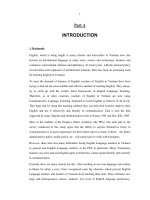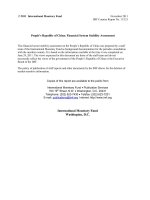Spending other people''s money
Bạn đang xem bản rút gọn của tài liệu. Xem và tải ngay bản đầy đủ của tài liệu tại đây (110.46 KB, 23 trang )
Chapter 12: Spending Other People's Money
Overview
It is rather a pleasant experience to be alone in a bank at night.
Willie Sutton, bank robber
[1]
Buying stuff is more fun when it's done with other people's money. Most of us like nice
things, but we don't like paying for them. Consequently, when we are spending other
people's money, we often buy goods we wouldn't ordinarily purchase.
[1]
Boone (1999), 167.
Frequent Flyer Miles
Frequent flyer miles exploit business travelers' willingness to spend other people's
money. Airlines give their passengers frequent flyer miles, which they can exchange for
free flights. Frequent flyer miles are a great deal for business travelers, because while
the business pays for the ticket the traveler often can use the miles for personal travel.
Imagine that you have a choice between two flights. The first is cheaper, but the second
gives you more frequent flyer miles. If you're paying, you would probably take the less
expensive ticket. If, however, your company pays for the ticket, but you get to keep the
frequent flyer miles, wouldn't it be tempting to pick the flight that gives you the most miles?
After all, if you're spending other people's money, what do you care about the ticket price?
Frequent flyer miles can be a bribe for employees to waste their company's money.
It's cost-effective to bribe those who spend other people's money. If I'm spending $1,000
of my own money, then to get me to spend it on your product, you would actually have to
give me something worth at least $1,000. If I'm buying for my company, with my
company's money, however, I should be willing to give you $1,000 in return for you
giving me only, say, $100.
Spending Students’ Money
The Wall Street Journal bribes college professors to get us to spend our students’ money.
The Journal gives college professors free subscriptions if the professors force their
students to subscribe. In fairness, the Journal is often a useful classroom tool, and
students buying it through their college classes get reduced rates. Still, by giving
professors free subscriptions, the Journal creates incentives for professors to
misappropriate their students’ money.
Textbook-choosing time provides professors with their best opportunity to waste
students’ money. When professors buy books with their own money, they certainly take
price into account. When we choose books for our students, however, it doesn’t cost us
anything extra if the books are expensive, especially since publishers always provide us
with a free personal copy. Professors have no reason to worry about prices when
deciding which textbook to use. Consequently, college textbooks are, page per page,
several times more expensive than other hardcover books. The greatest potential for
abuse manifests itself when professors assign their own books for class. In return for
making my students pay $30 each for this book, I might get $1.20 in after-tax royalties.
While I would of course be fired for forcing my students to directly give me $1.20, few
would object if I required them to purchase Game Theory at Work. Indeed, students are
often impressed when their professor wrote the textbook. Private liberal arts colleges like
Smith don’t charge that much in tuition, so it seems only fair that I be able to use my
textbook-assigning power to extract a little more money from my students’ parents.
To reduce the problems caused by professors’ spending their students’ money, colleges
should give professors financial incentives to minimize the cost of the books we make
our students buy. To amplify this problem, publishers should bribe professors to assign
expensive textbooks. Perhaps McGraw-Hill could give professors five frequent flyer miles
for every dollar our students spend on their textbooks.
Bribing Pilots
A few years ago The Wall Street Journal ran an interesting article on how airline
refuelers bribe pilots of corporate jets.
[2]
Since corporate jets can be refueled at multiple
airports along their routes, there is intense competition for their business. Normally, you
might think that these refuelers would compete on price. These refuelers, however,
realize that the pilots decide where to refuel, but the jets' owners pay for the gas. The
refuelers take advantage of the pilots' sending other people's money by bribing the pilots.
One company 'hands out one 8-ounce steak for every 100 gallons of fuel purchased.'
[3]
The steaks are given to the pilots by attractive, scantily clad women. The pilots are
usually given their freebies only 'if [they] forgo discounts on fuel.'
[4]
The refuelers are
careful to give the pilots their freebies secretly, thus proving that the pilots and refuelers
fully understand the game being played.
Why don't the refuelers simply give direct cash bribes to pilots? These bribes would
probably be illegal, so pilots, fearing criminal prosecution, would be reluctant to accept
them. Bribing pilots with meat is more effective because it's legal.
[2]
Wall Street Journal (September 8, 1998).
[3]
Ibid.
[4]
Ibid.
Conferences in Exotic Locations
Many businesses forbid their employees to accept gifts from suppliers. Suppliers, of
course, attempt to circumvent restrictions by making their gifts seem business related.
For example, imagine that Maria negotiates with several suppliers to buy expensive
equipment for her company. Maria’s company would probably be smart enough to not let
her accept free tickets to Hawaii from a supplier. What if, however, a supplier held a
conference in Hawaii and offered to send Maria there for free?
Even if a supplier doesn’t pay for the ticket, companies should still be suspicious of
conferences in exotic locations. Firms often pay for travel to conferences. Conference
organizers occasionally take advantage of this by holding their events in attractive
vacation spots. An employee is far more likely to waste his company’s money attending
a conference in Hawaii than, say, Buffalo, N.Y. Consequently, the nicer the conference
location, the more scrutiny a travel-funds request should be given.
Selfish Charity
Many consider corporate charity a noble undertaking. When you consider who really
pays for this charity, however, its morality becomes questionable. Charitable donors
usually get both pleasure and pain. The pleasure results from knowing you have helped
someone and from getting recognition for your good deeds. The pain comes from
actually having to give away your own money. When you give away other people’s
money, however, it’s all pleasure.
Stockholders own public companies. Consequently, when an executive donates some of
her company’s money to charity, she is really giving away her shareholders’ money.
Imagine if a college professor forced each of his students to donate $100 to some charity
of the professor’s choice. Few would praise the professor’s generosity.
Knowing that it’s easier to give away other people’s money than one’s own, charitable
groups often look to corporations for money. Charities often reward those who contribute
to them. When charities seek corporate money, however, they should focus more on
rewarding the giver than the stockholders. After all, the person who controls the money is
far more important than the person who merely owns it.
Political Bribes
Politicians get to spend taxpayers’ money. Imagine that the U.S. Congress is considering
awarding your company a contract worth $10 million in profit. How much money would
you be willing to pay to get this contract? Obviously, if you paid anything under $10
million, you would come out ahead. Such is the reason why corporations are so willing to
donate money to politicians.
“Good governance” advocates are always trying to reduce the influence of campaign
contributions. Reducing political contributions, however, is like stopping water from
flowing downhill. When a politician gives away other people’s money, the potential
recipients become desperate to influence the politician. If a congressman’s actions could
increase your profits by $10 million, it would be stupid not to give him at least a few
thousand dollars. Influential politicians therefore almost gravitationally attract campaign
contributions.
Splitting Bills
A group at a restaurant can either equally divide the bill or have everyone pay for the
food he got. When the bill is divided equally, everyone is spending everyone else’s
money. If there are five people in your group who will equally split the check, then the
cost to you of spending an extra $1 is but 20 cents. Thus, when considering whether you
should get a pricey $10 appetizer, remember that the appetizer will only increase what
you pay by $2. True, you will have to help pay for everyone else’s appetizers. You will,
however, have to do this regardless of whether you get an appetizer yourself.
Obviously, restaurants should encourage their patrons to split checks equally because
this creates incentives for everyone to order more. Restaurant customers often have
difficulty splitting the check so that everyone pays for what he ordered. Given the
widespread use of computers, it would be easy for most restaurants to separately
calculate the cost of each person’s food. Since restaurants want customers to equally
divide the bill, however, they have little incentive to provide these data.
When college roommates sharing a phone equally divide the bill, they are likely to make
too many toll calls. If two roommates know that they will equally split the bill, then the
cost to each of them of making an additional call is halved. This, of course, results in
both roommates making far more calls than they would if they were each paying their
own bill themselves. Consequently, to keep down telephone expenses roommates
should agree to specifically calculate the cost of both people’s calls.
Insurance
Insurance policies give you the right to spend the insurance company's money, and
whenever someone else is paying you should buy the best.
Let's say that you typically buy $30 worth of drinks when you go to your neighborhood
bar. One night the bar has a $30 all-you-can-drink special. Will this special cause you to
consume more or less alcohol?
After you get the special, each drink is free. The $30 purchase price represents a sunk
cost that you should ignore because you have to pay it regardless of whether you have
that next drink. Consequently, the special should intensify your intoxication.
Health insurance resembles an all-you-can-consume medical care special. You pay a
fixed amount for insurance, but then pay little for the medical services you subsequently
use. The problem for health insurance companies is that their insurance causes
customers to spend too much on health care.
After your car gets stolen, it's reasonably easy to calculate how much your insurance
company should reimburse you for. What if, however, you buy health insurance and you
get sick? How much of your health bills should the insurance company pay? If the
insurance company agrees to pay for everything you could possibly call a medical
expense, you will obviously have incentives to overspend. If the insurance company is
paying, why not get that expensive massage chair to help your back or the ergonomic
keyboard you need to alleviate carpal tunnel syndrome? When you have health
insurance, you purchase medical care with other people's money. Consequently, health
insurance companies need to constantly monitor their customers' medical expenditures.
The more price sensitive the demand for a service, the more health insurance
companies need to monitor. A service is very price sensitive if a decrease in price
causes consumers to buy much more of the service. Heart operations probably aren't
that price sensitive since a reduction in the price of bypass surgery is unlikely to induce
you to get another heart operation. Consequently, insurance providers don't have to
worry that health insurance will cause customers to get unneeded bypass surgery. Of
course, even if you must have a bypass operation, you don't necessarily need to have it
performed by the world's top surgeon. If someone else is paying, however, why not get
the best?
Consumers are in a strange game with insurance companies in which we want them to
rigidly monitor everyone else's expenditures but our own. The better job insurance
companies do at keeping down everyone else's costs, the less we have to pay. Of
course, once we have paid our premium we want our insurance company to give us the
best, and often most expensive, care.
Insurance companies are especially challenged at providing mental health coverage.
There are, I imagine, objective ways to determine whether someone needs a heart
bypass operation. It's much more difficult to figure out whether someone needs
psychotherapy. Furthermore, while almost no one would get a bypass operation just for
fun, a lot of mentally healthy people would enjoy spending a few hundred hours talking to
a friendly psychotherapist. Since it's difficult for an insurance company to determine how
much mental health care a customer needs, it's tough for them to control mental health
care costs by stopping fraud and abuse.









